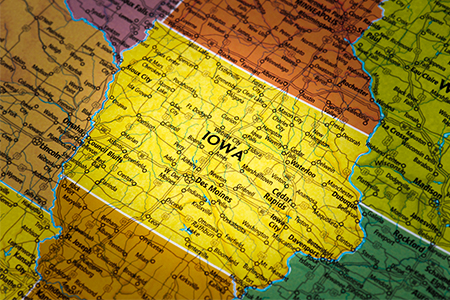You May Also Like
IOWA CPA EXAM & LICENSE REQUIREMENTS 2024
Keep reading to learn how to become a CPA in Iowa.

For those who want to embark upon the long path to becoming an accountant, there are fewer prizes more coveted than a license as a Certified Public Accountant. There are many other possible credentials for those who wish to work in forensics, financial management or fraud examination, but the CPA is regarded as the apex of the field. CPAs have state-supported credentials and can therefore sign off on audits, tax and legal documents. Though there are similarities across state boards, becoming a CPA is a process that can vary from state to state. Keep reading to learn how to become a CPA in Iowa.
General Qualifications
The standards for the Iowa Professional Licensing Bureau are similar to other states in that Iowa does not require a state residency, U.S. citizenship or a particular age for its applicants. The state does require a Social Security number you must fulfill specific requirements for education and experience. You must also pass the American Institute of Certified Public Accountants (AICPA) CPA exam and their Ethics exam as well.
Education
To begin the process, you will need to meet the state standards for education. Iowa’s rules are very similar to other states, but it does have some specific requirements. It is therefore important to meet this criteria so that your application goes through the first time.
A basic requirement is a bachelor’s degree, preferably with an accounting major. The state requires that you fulfill certain standards for coursework within your degree program in order to meet the licensure regulations. There are four ways to create a qualifying application:
Option 1
Iowa will accept a graduate degree in accounting from a regionally accredited university. Make sure that the accreditation agency is recognized by the Iowa board. Your advisor should be able to confirm this.
Option 2
If you received a graduate degree in business from an accredited university, your coursework must have included 24 hours in accounting with a course in each of these topic areas:
- Financial Accounting
- Auditing
- Taxation
- Managerial Accounting
- Neither intro level courses nor internship credits are acceptable
Option 3
Iowa will accept your application with only a bachelor’s degree as long as your transcript reflects the following coursework requirements:
- Financial Accounting
- Auditing
- Taxation
- Managerial Accounting
- Neither intro level courses nor internship credits are acceptable
Option 4
If you have a baccalaureate or graduate degree and meet both of the following qualifications your application will be accepted:
24 semester hours in accounting, including the following coursework:
- Financial Accounting
- Auditing
- Taxation
- Managerial Accounting
- Neither intro level courses nor internship credits are acceptable
AND
24 semester hours in business-related coursework such as the following:
- Finance
- Management
- Marketing
- Economics
- Business Law
Once you have completed the educational aspect of the application, you can have your original, official transcripts sent to the National Association of State Boards of Accountancy. Make certain that you have sealed official transcripts sent from every school you have attended. Transfer credits on a transcript must be verified with original documentation.
CPA Examination
Once accepted, you can apply to sit for the AICPA’s uniform CPA examination. This is a 4-part exam that is extremely rigorous. Many people must retake all or part of the test, so prepare as well as possible. Some accredited schools will have CPA preparation courses which you might consider. Commercial preparation courses will not count towards your license, but may be helpful. The four parts of the examination are:
- Financial Accounting and Reporting (FAR)–This section covers financial reporting frameworks from several industry experts. Candidates are asked to compare statements that reflect different reporting standards.
- Auditing and Attestation (AUD)–The AUD tests your knowledge of the International Standards of Auditing as well as U.S. standards.
- Regulation (REG)–Your professional and legal responsibilities are covered in this test.
- Business Environment and Concepts (BEC)–This portion covers general business concepts and international business. Written communication skills are vital to complete much of this test.
Once you apply to take a part of the test, it is imperative to sit for it within six months. If you do not, you will need to pay your application fees again before scheduling another exam. Once you have taken and passed your first exam, you will have 18 months to complete and pass all four sections.
Ethics Examination
Once you have passed what is considered to be the most difficult professional exam in the nation, you will then need to pass the AICPA’s Ethics exam. You can order the self-study course through the AICPA website. The course is 11 hours long and is administered on a CD-ROM that includes the course materials, plus 40 multiple choice questions for study and review. The exam is not considered terribly difficult, but it must be passed with a minimum score of 90, so be sure to study thoroughly.
CPAs are most densely concentrated in the western part of Iowa near Omaha. However, there are many accountants in the Des Moines and Cedar Rapids areas as well.
To get started on your path to becoming an Iowa CPA, visit the Iowa page on the NASBA website: NASBA-Iowa.